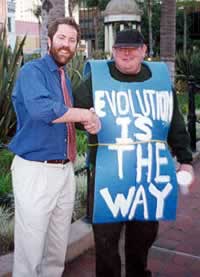The National Academies is launching a website with lots of scientific information about Darwin's theory of evolution
Avi Blizovsky

An American website will try to fight the opponents of evolution
The National Academies, the flagship of science organizations in the US, is launching a new website, designed to fight the opponents of evolution. The site has links to a lot of information about Darwin's theory of evolution. This is what the news agencies said.
The site will provide access to books (including a free PDF download option), position papers and other sources on evolution education as well as research in the field. The materials are produced by the national academies and other sources.
"The theory of evolution is one of the strongest known to science. We have always thought that it should be taught as a central component of every educational program," the independent organization announced. "In recent years, however, a broad movement has been growing that works for the introduction of non-scientific 'theories' in science classes," he added.
The site of knowledge will be happy for any assistance in translating from this site which is of course free.
To the American National Academy's Evolution website
Only the Americans remained with God
Pope Benedict XVI's claims about the rise of secularism in Western Europe were confirmed last week in a public opinion survey that included ten countries in the world. The survey, conducted by the IPSOS institute for the AP agency, states that the citizens of most Western countries are now much more secular than they were in the past, a fact that is reflected in many areas. Graduate respondents from the USA, Australia, Great Britain, Canada, France, Germany, Italy, Mexico, South Korea and Spain participated in the survey.
According to the findings, the French are the most secular nation in the West: 19% of French citizens define themselves as atheists. Also, the highest rate of opposition among members of parliament to the activity of religious lobbies was registered in France, 85%. To this must be added the severe restrictions imposed by France on the display of religious symbols in public institutions, such as the wearing of Muslim head coverings in schools. The second country where the rate of non-believers is so high is South Korea.
In Spain, where the government subsidizes the Catholic Church, and in Germany, where Catholics and Protestants live, the phenomenon of secularization has greatly expanded in the last generation, and the proportion of people who regularly attend churches is steadily decreasing. The results are almost the same in Britain, where the Anglican Church is struggling with a severe crisis. The Italians are an exception in this respect in Western Europe. 80% of them say that religion is still significant in their lives, and just over 50% say that they believe in God without question. But even in Italy, the opposition to the involvement of religion in politics is unequivocal. Only three out of ten Italians believe that the church should try to influence government decisions. This rate is also low in Spain, Germany, Great Britain, Canada, Australia and South Korea.
The USA clearly differs from its allies in the West in the issue of religious belief and the role of religion in public life. Americans unquestionably believe in God, and are much more true than people in the other countries that participated in the survey for religion in politics. Only the Mexicans are close to them in their views. However, compared to the United States, Mexicans strongly oppose the activity of religious lobbying organizations within the political system - a position that is consistent with the country's historical opposition to the influence of the church.
"In the United States there are many religions that try to encourage the involvement of religion in public life," says Roger Fink, a sociologist at Penn University. "This is where the big difference lies." The countries of Europe, on the other hand, have known bloody religious wars, and in particular they are opposed to giving religious people any touch in politics. Religion has not completely disappeared from politics in Europe, but its role is completely different than in the US. "In Germany there is a Christian-Democratic party, which talks about Christian values, but not like in the US," says Brent Nelsen, an expert on politics and religion at Furman University in South Carolina. "For them, the 'Christian' part of Christian values exists at their mothers' door, and it is not acceptable to take them outside."
Almost all American respondents said faith was important to them, and only 2% said they did not believe in God. Nearly 40% of respondents said that religious leaders should try to influence politicians, a much higher rate than in other countries. "Our country was founded on Judeo-Christian principles, and religious leaders have a duty to speak publicly about government policy," said David Black, a retiree from Osborne, Pennsylvania, who agreed to be interviewed at the end of the survey. "Otherwise they are spineless," he said.
